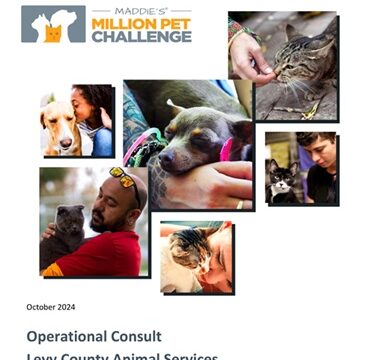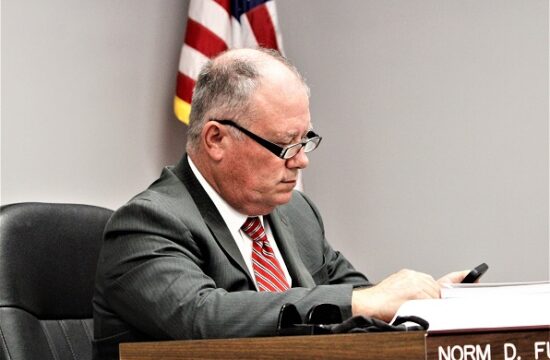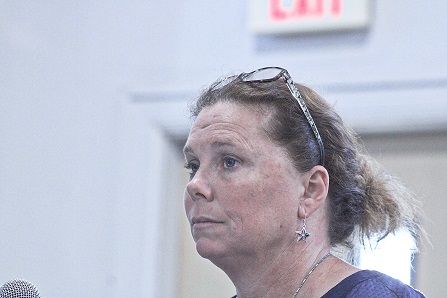Levy County Supervisor of Elections President Tammy Jones holds a federal court order requiring her to provide Spanish-Language ballots, bilingual interpreter and an 800 Spanish hotline number in next year’s presidential preference primary. Photos by Terry Witt:
By Terry Witt- Spotlight Senior Reporter
Levy County Supervisor of Elections Tammy Jones is preparing to develop Spanish-language ballots and provide bilingual interpreters for the 2020 presidential preference primary in response to a pair of federal court orders.
Chief United States District Judge Mark Walker of Florida’s Northern District said 32 Florida counties must provide Puerto Rican voters with language assistance at the polls if the voters don’t speak English well or not at all.
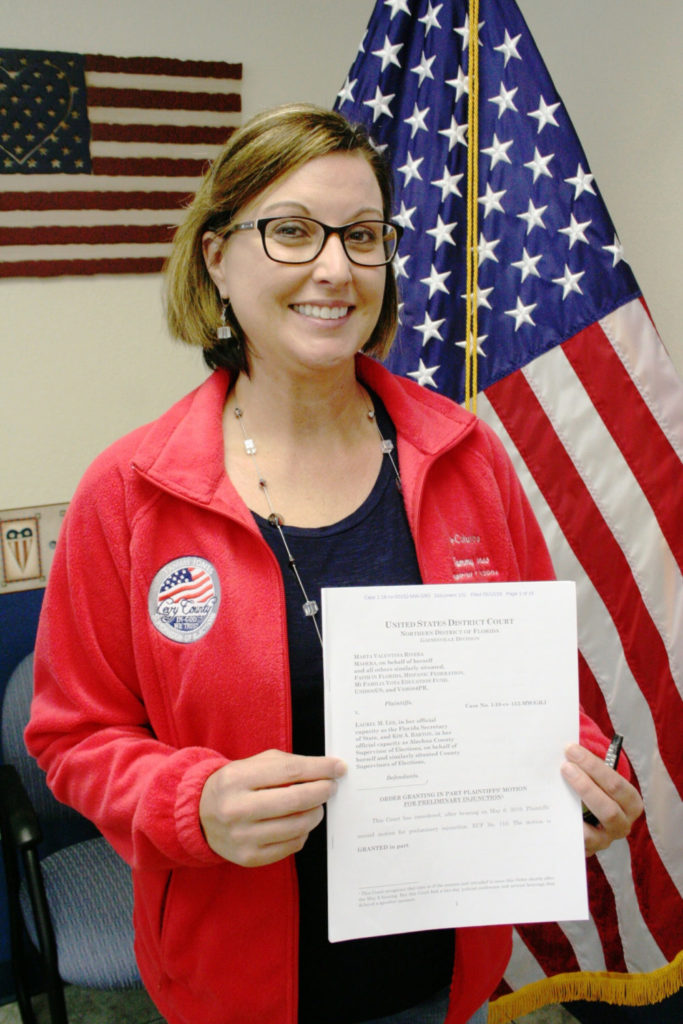
Levy County Supervisor of Elections President Tammy Jones holds a federal court order requiring her to provide Spanish-Language ballots, bilingual interpreter and an 800 Spanish hotline number in next year’s presidential preference primary.
The 32 counties must also provide an 800 Spanish language phone hotline at every precinct. Non-English speaking voters can call the number from the precinct to obtain a Spanish oral translation of the ballot.
The orders were the result of a civil rights class action lawsuit filed against Alachua County by Marta Valentia Rivera Madera, a Puerto Rico native who fled her homeland in 2017 after Hurricane Maria devastated the island. Thousands of Puerto Ricans moved to Florida after the hurricane.
As a direct result of the Category 5 hurricane, Madera moved to Gainesville, Fla. to live with her daughter. Madera, who speaks no English, wanted to vote in the 2018 elections, according to the judge’s Sept. 2018 order. At the time she filed her lawsuit, Alachua County wasn’t providing Spanish-language ballots.
Puerto Rican residents are American citizens that have no voting rights on the island except in presidential primaries, but once they reside on American soil and register they have the same voting rights as any other American.
Levy County and Alachua County were among the counties affected by the federal court orders issued by Walker. Counties have the option of providing separate English and Spanish ballots for presidential preference primary on March 17 next year, or they can provide a bilingual ballot with both Spanish and English in separate columns. Counties must have bilingual interpreters in place well before absentee ballots are sent out in advance of the presidential preference primary, according to the May 10 order.
Walker said his May 10 order was intended to set out the requirements for providing Spanish speakers with language assistance at the polls in the presidential preference primary and future elections and to provide the state with guidance on why the decades-old Voting Rights Act of 1965 must be taken seriously. He said he wasn’t trying to make state law with his orders. His intent was to ensure state compliance with the Voting Rights Act.
“This order is not designed to supplant future (state) rules. But ongoing court intervention may be necessary,” Walker advised.
Madera alleged in her lawsuit that her voting rights were violated as a non-English speaking American citizen because she couldn’t understand or read the English-only ballot. Puerto Rico is a U.S. Territory and has flown the American flag since 1898. Puerto Ricans have been American citizens since 1917, the 2018 order said. Most of the island’s schools teach students in Spanish, not English.
The Voting Rights Act said any person educated in an American-flag school and who speaks a language other than English cannot be denied the right to vote in American elections if they are unable to read, write, understand or interpret the English language. They must have completed the 6th grade in school, the 2018 order said.
The first order dismissed a motion by the Florida Secretary of State to dismiss the lawsuit and required counties to have sample Spanish language ballots in place for the 2018 election. Walker didn’t force counties to provide Spanish-language ballots for voters in 2018. He said it was too close to the election.
In his 2018 order, Walker said 13 Florida counties already provide Spanish-language ballots. He said the Voting Rights Act specifically singled out non-English speaking Puerto Ricans living in the United States as having the right to vote.
“In 1965, Congress passed the Voting Rights Act. Among its many provisions, the Act establishes and protects the voting rights of citizens educated in Puerto Rico. Congress explicitly passed this provision to address the Puerto Rican population living outside Puerto Rico. Florida has 67 counties. Thirteen counties provide Spanish-language ballots in compliance with the provisions of the Voting Rights Act. This provision requires non-English ballots in political subdivisions where either more than five percent of the voting-age citizenry or more than 10,000 citizens of voting age are members of a single-language minority or have limited proficiency in English,” the order said.
Walker drew from a study by University of Florida political professor Daniel Smith for his conclusion that more than 36,500 registered American voters of Puerto Rican descent currently live in the 32 counties covered by the order. As one of his sources, Smith used the American Community Survey of the United States Census Bureau to conclude that more than 30,000 individuals with Puerto Rican heritage lack full fluency in English. He said there are about 200,000 Floridians of Puerto Rican heritage living in the state.
The counties affected by the order are Alachua, Bay, Brevard, Charlotte, Citrus, Clay, Columbia, Duval, Escambia, Flagler, Hernando, Highlands, Indian River, Jackson, Lake, Leon, Levy, Manatee, Marion, Martin, Monroe, Okaloosa, Okeechobee, Pasco, Putnam, St. Johns, St. Lucie, Santa Rosa, Sarasota, Sumter, Taylor and Wakulla.
Twenty Florida counties are exempt from the order and 13 have implemented Spanish-language ballots on their own, but Jones said Gov. Ron DeSantis has made the comment that all 67 Florida counties may be required to provide Spanish-language assistance at the polls.
Jones announced the Spanish-language ballot assistance requirements in the June 18 Levy County Commission meeting as she presented her proposed $636,000 budget to the board. The budget is for the 2019-20 year. She felt she would be able to absorb the additional costs of adding a Spanish-language ballot and bilingual interpreters without additional cost. Her budget is an increase of $65,000 over the previous year but $60,000 of that is for the presidential preference primary. She said health insurance for her department is increasing 8-10 percent ($3,000). She said it costs $60,000 to prepare for and implement an election.
Her budget includes $7,440 for a security monitoring system funded by a state grant.
Jones said she is advertising for bilingual poll workers who can speak, read, and write English and Spanish. She doesn’t know yet whether she will place a bilingual worker in every precinct. For the time being, her plans are to place a bilingual poll worker in the busiest precincts -Bronson, Chiefland and Williston. The bilingual poll workers will be considered part-time employees. She told commissioners she doesn’t want to ever be forced to replace employees with someone who is bilingual. She has no plans to do that.
Levy County’s first experience with Spanish-language ballots occurred in 2018 when Jones was required to have a sample Spanish-language sample ballot at every precinct for non-English speaking voters, but the latest order from Walker extends the requirements to having actual Spanish-language ballots and (if practicable) bilingual interpreters for the presidential primary. The term “if practicable” gives Jones a little wiggle room. It means she is to provide as many interpreters as she is able. Her plans are to provide as many interpreters as she can afford to employ.
Jones said she is about 99 percent certain she will use a bilingual ballot with Spanish words on one side and English words on the other side of the same ballot. All the names will be in English. She plans to make the print as big as legally possible on the ballot. She said poll workers have magnifying sheets at all precincts that can be laid over top of the ballot to make the words and names larger.
She said precincts also have devices to assist the handicapped and disabled voters. Jones calls them Americans with Disabilities (ADA) computers. The disabled can use these devices. She recently upgraded her ADA software to translate English or Spanish.
Jones said it was never her intent to deny anyone the right to vote. She said Levy County is small and she is certain there are Puerto Rican voters in Levy County but she never thought there would be a requirement for provide Spanish-language ballots.
Under the judge’s May order, she said the county would be required to provide Spanish-language assistance even if there was just one Puerto Rican voter in Levy County. She is prepared to follow the law.
“I certainly don’t want to disenfranchise anyone,” she said.
Jones is president of the Florida State Association of Supervisors of Elections. She will hold the post for one year. All state presidents are given a patriotic painting to be displayed in a public setting. She is displaying the painting in her front lobby. The painting is signed on the back by Jones and state presidents who served before her.
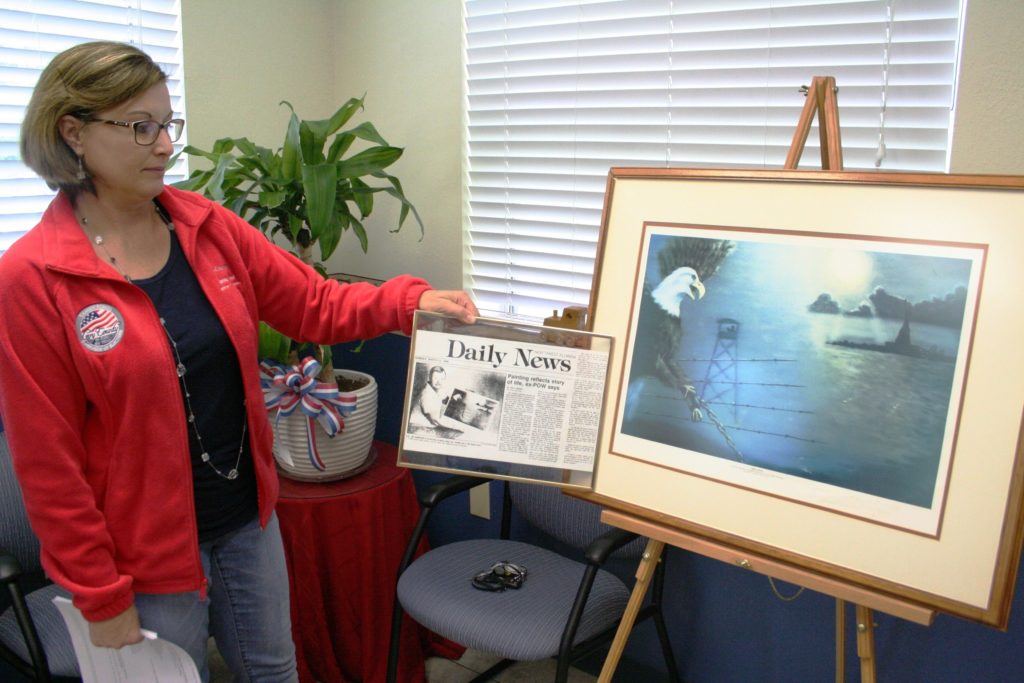
Florida State Association of Supervisors of Elections Tammy Jones shows off a patriotic painting in the front lobby of the Levy County Supervisor of Elections office in Bronson. She will have the painting for her one year in office as state president. She and every state president before her for many years has signed the back of the painting.
——–
Levy County Board of County Commission Budget Meeting June 18, 2019; Posted June 22, 2019
Below are the links for the two orders:
First order was September 10, 2018: https://www.leagle.com/decision/infdco20180911778#
Second order May 10, 2019: https://www.leagle.com/decision/infdco20190513945




